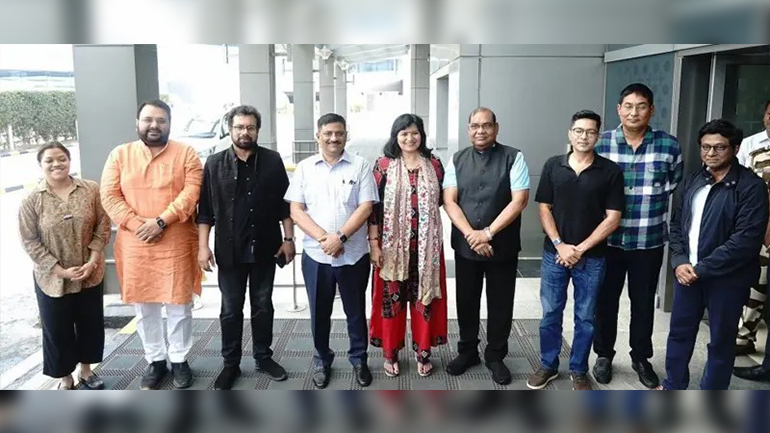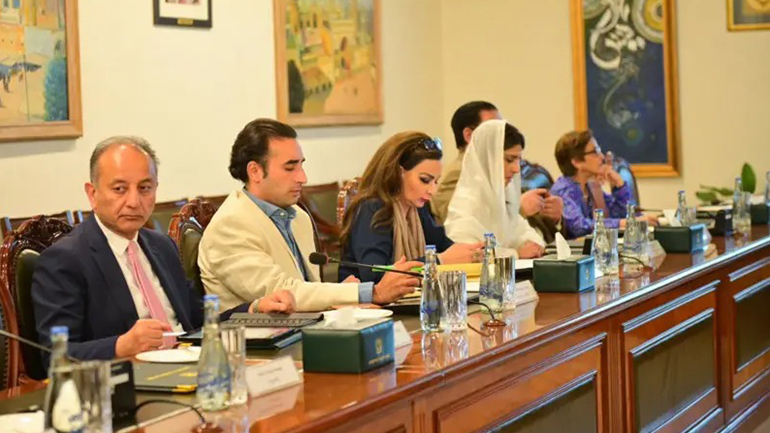Following a four-day conflict and military actions between Pakistan and India, both countries have announced plans to dispatch high-level diplomatic delegations on international missions. These delegations include prominent political figures and aim to present their respective narratives to the global community. Although a ceasefire is currently in place, conflicting claims from both sides regarding the events that unfolded over the 88-hour standoff have raised questions about the true purpose and potential outcomes of these diplomatic campaigns. India was the first to announce such a diplomatic initiative, prompting Pakistan to follow suit with a similar plan. The Pakistani government has indicated that a delegation led by former Foreign Minister and Pakistan People’s Party Chairman Bilawal Bhutto Zardari will visit London, Washington, and Brussels. According to the Prime Minister’s Office, the delegation’s mission is to “expose India’s propaganda and malicious conspiracies at the international level.” Other members of the Pakistani delegation include Dr. Musadik Malik, Engineer Khurram Dastgir, Senator Sherry Rehman, Hina Rabbani Khar, Faisal Subzwari, Tehmina Janjua, and Jalil Abbas Jilani, as stated in an official release from Prime Minister Shehbaz Sharif’s office.
On the other hand, the Indian government is launching a massive diplomatic campaign at the international level, sending seven parliamentary delegations to countries across the United States, Europe, Africa, and the Middle East. These Indian delegations, composed of members of parliament, will visit a total of 32 countries between May 21 and June 5. Before their departure, Indian Foreign Secretary Vikram Misri briefed the parliamentary leaders on various aspects of the Pahalgam attack and the subsequent military confrontations with Pakistan. This diplomatic offensive is taking place at a time when India’s own government is facing several internal questions, raising concerns about the true purpose of the campaign. Is it aimed at suppressing criticism at home, or is it genuinely intended to achieve global support against Pakistan? Equally important is the question of how effective Pakistan’s counter-diplomatic efforts will be in matching or neutralizing India’s strategy. Before addressing these questions in detail, let’s take a look at the destinations India has selected for its diplomatic delegations.
Where is India sending delegations?
The first Indian parliamentary delegation, led by Shiv Sena MP Shrikant Eknath Shinde, is set to visit the United Arab Emirates, Liberia, the Democratic Republic of Congo, and Sierra Leone. Another delegation, headed by Congress leader Shashi Tharoor, will visit the United States, Panama, Guyana, Brazil, and Colombia. This delegation is scheduled to begin its tour from Guyana on May 25. Senior BJP leader Ravi Shankar Prasad will lead a separate delegation that will visit the United Kingdom, France, Germany, the European Union, Italy, and Denmark to present "India’s position" to the political leadership of these countries. Their tour will commence from France on May 25. A delegation led by Janata Dal (United) leader Sanjay Jha will visit Indonesia, Malaysia, South Korea, Japan, and Singapore. In contrast, another team under BJP leader Baijayant Panda will tour Saudi Arabia, Kuwait, Bahrain, and Algeria. According to the Indian Ministry of External Affairs, DMK MP Kanimozhi will lead a delegation to Greece, Slovenia, Latvia, and Russia. Meanwhile, NCP leader Supriya Sule will head a parliamentary delegation to Egypt, Qatar, Ethiopia, and South Africa.

India's first all-party delegation, led by JD(U) MP Sanjay Kumar Jha, has left for Indonesia, Malaysia, South Korea, Japan, and Singapore.
Why did India choose delegations comprising all political parties?
India launched this diplomatic campaign at a time when opposition parties are raising tough questions for the BJP government regarding the ceasefire and potential losses during the recent clashes with Pakistan. Congress leader Rahul Gandhi has repeatedly questioned how much damage the Indian Air Force suffered in the conflict and whether any aircraft were lost. He also criticized Foreign Minister S. Jaishankar for stating that Pakistan had been informed before the launch of "Operation Sandur." During this period, the Congress party’s student wing staged a protest outside Jaishankar’s residence, holding posters that read, “Why did you inform Pakistan before the operation?” Congress also objected to the government unilaterally selecting members of parliament for the diplomatic delegations without consulting other political parties. It’s worth noting that Congress MP Shashi Tharoor, who was selected for one of the delegations, has taken a position that differs from his party’s official stance following the Pahalgam attack. He has often expressed support for the government and was even rumored at one point to be considering joining the ruling BJP—a claim he denied, saying India is a democracy and he is entitled to express his personal views, which may not always align with his party’s position. Tharoor also chairs the Parliamentary Committee on External Affairs. Despite the political disagreements, the announcement of the delegations’ travel dates and a briefing from the foreign secretary prompted a temporary political truce, with parties now speaking in a unified voice on the issue. Why is Delhi’s diplomacy being questioned after the India-Pakistan tension? First Drone War Between Two Nuclear Powers: Have India and Pakistan Entered a Dangerous New Phase of Conventional Conflict? India Targets Turkey Over Support for Pakistan. Pakistan Claims It Misled Indian BrahMos Missile: Can Hypersonic Missiles Be 'Blinded'
Political analyst Nirupama Subramanian the that one key aim of sending all-party delegations abroad is to neutralize the opposition. She remarked, “These delegations won’t fundamentally change anything. Until the Pahalgam attack, the global community's focus was on terrorism. But after Operation Sandur, as the situation neared full-scale war, the world began thinking seriously about the threat of nuclear conflict between India and Pakistan.” She added that the international community is already well aware of the narrative these parliamentary delegations are presenting, so it’s unlikely to have a significant impact. However, Dr. Pushpesh Pant, former professor of diplomacy at Jawaharlal Nehru University, argues that Western countries are deliberately exaggerating the threat of nuclear escalation. Speaking to Dr. Pant, said that in the past, governments have sent opposition leaders abroad to present India’s case, but those efforts were usually confined to the United Nations. According to him, the Modi government felt the need for such a large-scale diplomatic campaign because Operation Sandur severely damaged the credibility of both the Prime Minister and the government. “In fact,” he said, “Modi's thunder was stolen when former U.S. President Donald Trump claimed credit for brokering the ceasefire. The grand victory rally planned afterward couldn’t happen.” Dr. Pant noted that when Prime Minister Modi addressed the nation after Operation Sandur, people were disappointed because he didn’t answer any pressing questions. “He simply repeated things the public already knew. The real purpose of this diplomatic campaign, in my view, is not just to inform the world, but to reassure the Indian public.”
The goal of the Indian diplomatic campaign: diplomatic isolation of Pakistan?
Indian media has widely reported that one of the primary objectives of the parliamentary delegations is to isolate Pakistan in the international community. When asked about this, Professor Pushpesh Pant commented: “We’ve been hearing the slogan ‘Modi hai to mumkin hai’ (If Modi is there, it’s possible) for a long time—but isolating Pakistan globally is not going to work.” “As long as China stands behind Pakistan, as long as the U.S. finds Pakistan useful, as long as it continues to receive loans from the World Bank, and countries like Saudi Arabia, Bahrain, and Qatar are helping it manage its economic crisis—I don’t think Pakistan can be isolated. In my opinion, Pakistan is not alone. As long as the U.S., China, and to an extent Russia support it, isolating it will be extremely difficult for India.” Professor Pant emphasized that the realities of diplomacy are vastly different and more complex than domestic politics. “We shouldn’t take too much pride in being the fourth or fifth-largest economy in the world. We must also remember that 80 crore (800 million) people in India rely on free rations to survive. We are still far behind China and the U.S.,” He added, “India is walking a diplomatic tightrope. We need to maintain our ties with Russia, keep improving relations with the U.S., and simultaneously manage our equations with both Israel and Muslim-majority countries in the Middle East.” Despite a long-standing dispute with China, our trade volume with them remains significant. Diplomacy requires acknowledging and balancing all of these complex realities.”

Pakistan's Foreign Minister Ishaq Dar welcomes British Foreign Secretary David Lammy in Islamabad.
Pakistan's diplomatic campaign
Foreign affairs analysts and experts say that Pakistan’s decision to send a diplomatic delegation to Western capitals in response to India's outreach is a wise move. Former Foreign Secretary Aizaz Chaudhry: “The government’s agenda is very clear: to present Pakistan’s position on terrorism, water, and Kashmir to the world.” He stated that there is clear evidence of India’s involvement in acts of terrorism inside Pakistan, and this is the right time for the government to convey its position globally, particularly that Pakistan had no involvement in the Pahalgam attack. Chaudhry added that the Pakistani delegation will also inform Western governments that blocking water is a crime against 240 million people. “The Kashmir issue must be resolved; until then, relations between the two countries will not normalize. If Pakistan and India cannot resolve these issues bilaterally, then a third party will have to mediate. The Trump administration in the U.S. has already offered to play a role in facilitating dialogue.” However, some analysts believe that both India and Pakistan sending delegations to Western capitals resembles a public relations campaign. Professor Muhammad Shoaib of Quaid-e-Azam University in Islamabad said: “During the conflict, both Pakistan and India were in constant contact with foreign diplomats and were keeping them updated on developments. These recent efforts are a continuation of that communication.” “The host countries are already well aware of the entire situation and mostly rely on the reports from their embassies.” According to Professor Shoaib, this diplomatic mission is more critical for Pakistan because: “Pakistan often faces more criticism on issues of terrorism and militancy. This allows Pakistani representatives to present their narrative before large international audiences, highlight the steps Pakistan has taken in recent years, outline plans, share expectations from the global community, and communicate their stance on neighboring India.”

The Pakistani delegation includes Bilawal Bhutto Zardari, Dr. Mosaddiq Malik, Engineer Khurram Dastgir, Senator Sherry Rehman, Hina Rabbani Khar, Faisal Sabzwari, Tehmina Janjua, and Jalil Abbas Jilani.
Powered by Froala Editor



